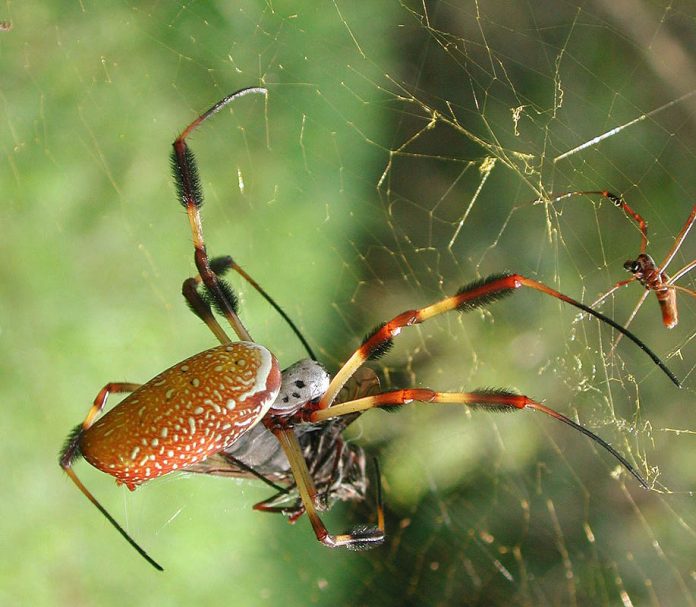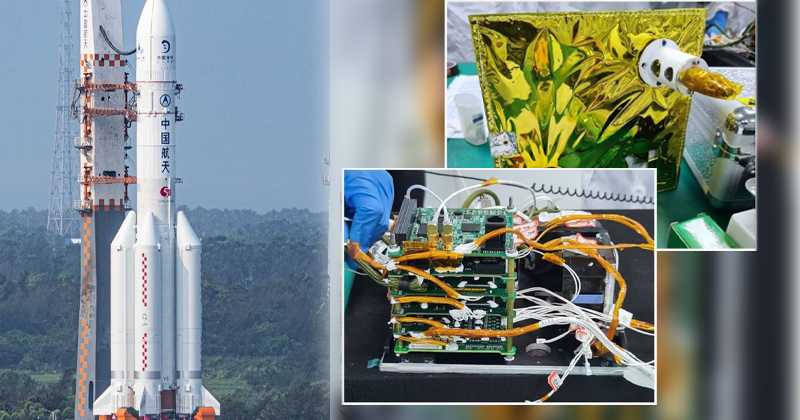U.S. Military Testing Genetically Engineered Spider Silk for Body Armor
Inserting spider's DNA into silkworms yields a tough fabric that has the strength of a spider’s silk but the production speed of a silkworm.

Spider silk is considered one of nature’s toughest substances, comparable in strength to the Kevlar plastic present in bulletproof vests but is way more flexible. Kraig Biocraft Laboratories, a firm from Ann Arbor, Michigan, genetically altered silkworms to manufacture a fiber that is just like pure spider silk. Last week, the firm announced a U.S. Department of Defense (DoD) contract to test this genetically engineered silk, which they are calling Dragon Silk™ for potential use in body armor.
There is a reason that silk from worms is affordable but you possibly can’t purchase dresses made out of spider silk: spiders are cannibalistic and territorial, which makes farming them for material manufacturing ridiculously exorbitant.
Enter the wonderful new marvel that’s called genetic engineering. In 2000, researchers first isolated and sequenced the key proteins that create spider silk (ampullate spidroin-1, spidroin-2, and so on.) That allowed scientists to reproduce spider silk proteins in E coli bacteria, yeast and other substances in somewhat the same method as pharmaceutical firms produce proteins for medicine. However, these techniques didn’t yield spider silk in large enough quantities.
The technology behind Dragon Silk relies in part on the work of Donald L. Jarvis, Malcolm J. Fraser, and their colleagues. As they describe in this research paper, they introduced particular pieces of spider DNA into silkworm eggs, creating a completely new kind of silkworm that can spin spider silk. This enabled them to get the silk in larger quantities.
The Army’s Soldier Protection and Individual Equipment, or PM–SPIE office, will give Kraig Biocraft $99,962 to test a series of “shoot packs” to see how the fabric stands up to abuse. “We’re going to provide them a series of various thicknesses, thread counts and construction techniques that they’ll test against standard material performance specs,” says Jon Rice, the chief operating officer at Kraig Biocraft. If the fabric performs well, the Army may enhance the award to one million dollars. Rice doesn’t anticipate Dragon Silk to be a direct substitute for Kevlar, which has a strength of 3 gigapascal, whereas Spider silk has a strength of 2 gigapascal, or about two-thirds as strong. “However Kevlar has an elasticity of 3%,” says the COO. “If you have a Kevlar fiber, it is not going to move at all. Our fibers have a 30 to 40% elasticity before they break.” Rice also told us that “Dragon Silk scores very highly in tensile strength and elasticity, which makes it one of the toughest fibers known to man and the ideal material for many applications”
The base effort on this contract is expected to last about 10 months and is the company’s first US DoD award.
Source: U.S. Military Testing Genetically Engineered Spider Silk for Body Armour
Inserting spider's DNA into silkworms yields a tough fabric that has the strength of a spider’s silk but the production speed of a silkworm.

Spider silk is considered one of nature’s toughest substances, comparable in strength to the Kevlar plastic present in bulletproof vests but is way more flexible. Kraig Biocraft Laboratories, a firm from Ann Arbor, Michigan, genetically altered silkworms to manufacture a fiber that is just like pure spider silk. Last week, the firm announced a U.S. Department of Defense (DoD) contract to test this genetically engineered silk, which they are calling Dragon Silk™ for potential use in body armor.
There is a reason that silk from worms is affordable but you possibly can’t purchase dresses made out of spider silk: spiders are cannibalistic and territorial, which makes farming them for material manufacturing ridiculously exorbitant.
Enter the wonderful new marvel that’s called genetic engineering. In 2000, researchers first isolated and sequenced the key proteins that create spider silk (ampullate spidroin-1, spidroin-2, and so on.) That allowed scientists to reproduce spider silk proteins in E coli bacteria, yeast and other substances in somewhat the same method as pharmaceutical firms produce proteins for medicine. However, these techniques didn’t yield spider silk in large enough quantities.
The technology behind Dragon Silk relies in part on the work of Donald L. Jarvis, Malcolm J. Fraser, and their colleagues. As they describe in this research paper, they introduced particular pieces of spider DNA into silkworm eggs, creating a completely new kind of silkworm that can spin spider silk. This enabled them to get the silk in larger quantities.
The Army’s Soldier Protection and Individual Equipment, or PM–SPIE office, will give Kraig Biocraft $99,962 to test a series of “shoot packs” to see how the fabric stands up to abuse. “We’re going to provide them a series of various thicknesses, thread counts and construction techniques that they’ll test against standard material performance specs,” says Jon Rice, the chief operating officer at Kraig Biocraft. If the fabric performs well, the Army may enhance the award to one million dollars. Rice doesn’t anticipate Dragon Silk to be a direct substitute for Kevlar, which has a strength of 3 gigapascal, whereas Spider silk has a strength of 2 gigapascal, or about two-thirds as strong. “However Kevlar has an elasticity of 3%,” says the COO. “If you have a Kevlar fiber, it is not going to move at all. Our fibers have a 30 to 40% elasticity before they break.” Rice also told us that “Dragon Silk scores very highly in tensile strength and elasticity, which makes it one of the toughest fibers known to man and the ideal material for many applications”
The base effort on this contract is expected to last about 10 months and is the company’s first US DoD award.
Source: U.S. Military Testing Genetically Engineered Spider Silk for Body Armour






































